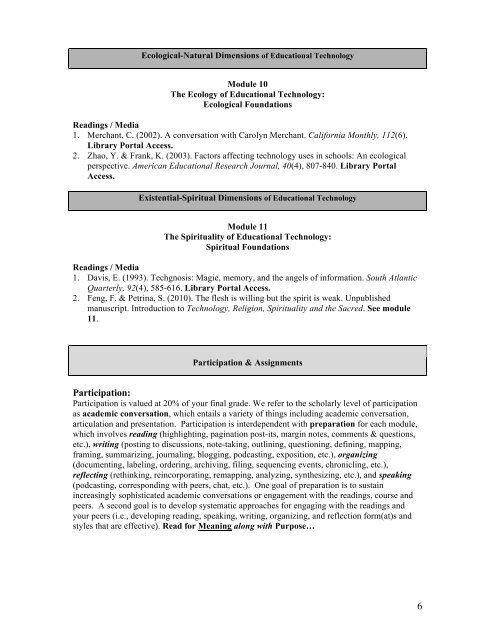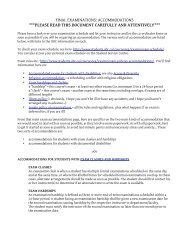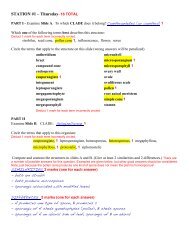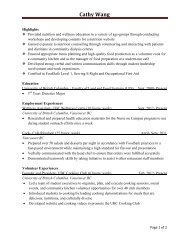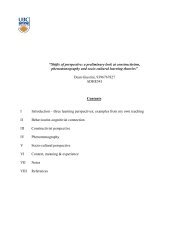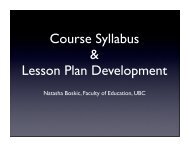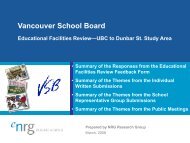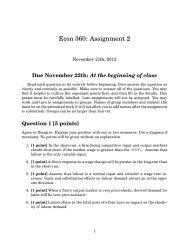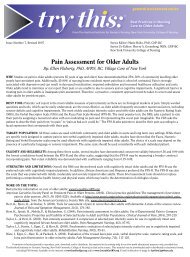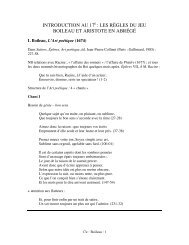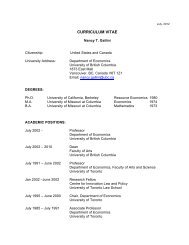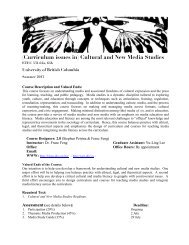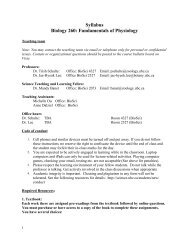ETEC 511 Syllabus (2011) - UBC Blogs - University of British ...
ETEC 511 Syllabus (2011) - UBC Blogs - University of British ...
ETEC 511 Syllabus (2011) - UBC Blogs - University of British ...
Create successful ePaper yourself
Turn your PDF publications into a flip-book with our unique Google optimized e-Paper software.
Ecological-Natural Dimensions <strong>of</strong> Educational Technology<br />
Module 10<br />
The Ecology <strong>of</strong> Educational Technology:<br />
Ecological Foundations<br />
Readings / Media<br />
1. Merchant, C. (2002). A conversation with Carolyn Merchant. California Monthly, 112(6).<br />
Library Portal Access.<br />
2. Zhao, Y. & Frank, K. (2003). Factors affecting technology uses in schools: An ecological<br />
perspective. American Educational Research Journal, 40(4), 807-840. Library Portal<br />
Access.<br />
Existential-Spiritual Dimensions <strong>of</strong> Educational Technology<br />
Module 11<br />
The Spirituality <strong>of</strong> Educational Technology:<br />
Spiritual Foundations<br />
Readings / Media<br />
1. Davis, E. (1993). Techgnosis: Magic, memory, and the angels <strong>of</strong> information. South Atlantic<br />
Quarterly, 92(4), 585-616. Library Portal Access.<br />
2. Feng, F. & Petrina, S. (2010). The flesh is willing but the spirit is weak. Unpublished<br />
manuscript. Introduction to Technology, Religion, Spirituality and the Sacred. See module<br />
11.<br />
Participation & Assignments<br />
Participation:<br />
Participation is valued at 20% <strong>of</strong> your final grade. We refer to the scholarly level <strong>of</strong> participation<br />
as academic conversation, which entails a variety <strong>of</strong> things including academic conversation,<br />
articulation and presentation. Participation is interdependent with preparation for each module,<br />
which involves reading (highlighting, pagination post-its, margin notes, comments & questions,<br />
etc.), writing (posting to discussions, note-taking, outlining, questioning, defining, mapping,<br />
framing, summarizing, journaling, blogging, podcasting, exposition, etc.), organizing<br />
(documenting, labeling, ordering, archiving, filing, sequencing events, chronicling, etc.),<br />
reflecting (rethinking, reincorporating, remapping, analyzing, synthesizing, etc.), and speaking<br />
(podcasting, corresponding with peers, chat, etc.). One goal <strong>of</strong> preparation is to sustain<br />
increasingly sophisticated academic conversations or engagement with the readings, course and<br />
peers. A second goal is to develop systematic approaches for engaging with the readings and<br />
your peers (i.e., developing reading, speaking, writing, organizing, and reflection form(at)s and<br />
styles that are effective). Read for Meaning along with Purpose…<br />
6


